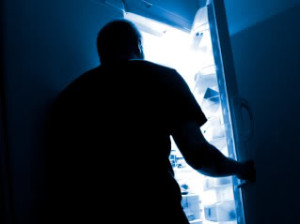- Calls to this hotline are currently being directed to Within Health, Fay or Eating Disorder Solutions
- Representatives are standing by 24/7 to help answer your questions
- All calls are confidential and HIPAA compliant
- There is no obligation or cost to call
- Eating Disorder Hope does not receive any commissions or fees dependent upon which provider you select
- Additional treatment providers are located on our directory or samhsa.gov
The Night Eating Diagnostic Syndrome Questionnaire

For starters, some of you may not know that Night Eating Syndrome (NES) is an actual disorder. NES falls under the DSM-5 category of “Other Specified Feeding or Eating Disorders (OSFED)” and is estimated to impact approximately 1.5% of the general population [1].
The diagnosis itself involves individuals having “repeated episodes of eating at night including waking from sleep to eat, excessive consumption of food after the evening meal, and awareness and recall of night eating—and significant distress or impairment related to the night eating [1].”
Diagnostic criteria specifically suggest individuals must eat at least 25% of their food intake after their evening meal consistently for three months for diagnosis [1]. Those with Night Eating Syndrome often report that they eat after waking up from sleep in order to help themselves fall back to sleep.
NES is often associated with binge eating, however, they differ in that the food consumed by those with NES might not necessarily be large or include a loss of control over food intake [2].
The NEDQ
The Night Eating Diagnostic Questionnaire (NEDQ) is an assessment tool used to measure NES behaviors.
The NEDQ asks 20 “yes” or “no” questions designed to measure the presence of the following criteria:
- One or both of the following.
- At least 25% of food intake is consumed after the evening meal.
- At least two nocturnal eating episodes per week.
- Awareness and recall of evening and nocturnal eating episodes are present.
- At least three of the following.
- Lack of desire to eat in the morning and/or breakfast is omitted four or more times per week.
- Presence of a strong urge to eat between dinner and sleep onset and/or during the night.
- Sleep maintenance and/or onset insomnia are present four or more times per week.
- Presence of a belief that one must eat in order to initiate or return to sleep.
- Mood is frequently depressed or mood is worse in the evening.
- The disorder is associated with significant distress and/or impairment in functioning.
- Maintenance of disordered eating for at least three months.
- The disorder is not secondary to substance abuse or dependence, medical disorder, medication, or another psychiatric disorder [3].
This test is viewed as valid but is relatively new. Based on this, a new study was performed seeking to learn whether or not the NEDQ accurately measures the proposed criteria for Night Eating Syndrome.
The Results
 This study involved 722 men and women with Night Eating Syndrome symptoms taking the NEDQ to determine how it assessed these symptoms. Results indicated that the NEDQ, impressively, assesses all of the NES Criteria [3].
This study involved 722 men and women with Night Eating Syndrome symptoms taking the NEDQ to determine how it assessed these symptoms. Results indicated that the NEDQ, impressively, assesses all of the NES Criteria [3].
This supports the proposed diagnostic criteria mentioned above as “providing a cohesive diagnosis for NES [3].”
The study also found that “morning anorexia,” or the lack of desire to eat in the morning, fits is correlated with much of the Night Eating Syndrome criteria and, therefore, should “remain as one of the five optional NES diagnostic criteria as proposed [3].”
Additionally, it was determined that NES criteria is linked to “higher depression scores, more sleep problems, and more food addiction symptoms, especially in older people” and that “body weight was associated with night eating in the older sample [3].”
These results help confirm for disordered eating professionals that the NEDQ is a reliable and valid assessment to measure the presence of Night Eating Syndrome symptoms.
Resources:
[1] Muhlheim, L. (2019). Night eating syndrome. Very Well Mind, retrieved from https://www.verywellmind.com/what-is-night-eating-syndrome-4171515. [2] Unknown (2019). Night Eating Syndrome. Walden Eating Disorders, retrieved from https://www.waldeneatingdisorders.com/popular-searches/night-eating-syndrome-nes/. [3] Nolan, L. J., Geliebter, A. (2019). Factor structure of the Night Eating Diagnostic Questionnaire (NEDQ) and an evaluation of the diagnostic criteria of the night eating syndrome. Journal of Eating Disorders, 7:39.About the Author:
 Margot Rittenhouse, MS, PLPC, NCC is a therapist who is passionate about providing mental health support to all in need and has worked with clients with substance abuse issues, eating disorders, domestic violence victims, and offenders, and severely mentally ill youth.
Margot Rittenhouse, MS, PLPC, NCC is a therapist who is passionate about providing mental health support to all in need and has worked with clients with substance abuse issues, eating disorders, domestic violence victims, and offenders, and severely mentally ill youth.
As a freelance writer for Eating Disorder Hope and Addiction Hope and a mentor with MentorConnect, Margot is a passionate eating disorder advocate, committed to de-stigmatizing these illnesses while showing support for those struggling through mentoring, writing, and volunteering. Margot has a Master’s of Science in Clinical Mental Health Counseling from Johns Hopkins University.
The opinions and views of our guest contributors are shared to provide a broad perspective on eating disorders. These are not necessarily the views of Eating Disorder Hope, but an effort to offer a discussion of various issues by different concerned individuals.
We at Eating Disorder Hope understand that eating disorders result from a combination of environmental and genetic factors. If you or a loved one are suffering from an eating disorder, please know that there is hope for you, and seek immediate professional help.
Published March 28, 2020, on EatingDisorderHope.com
Reviewed & Approved on March 28, 2020, by Jacquelyn Ekern MS, LPC

The EatingDisorderHope.com editorial team comprises experienced writers, editors, and medical reviewers specializing in eating disorders, treatment, and mental and behavioral health.

